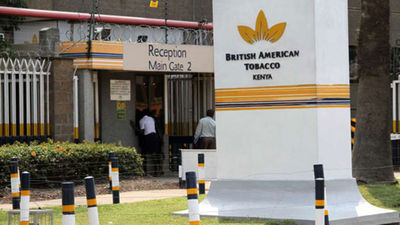News
Whistleblower Report Reveals How BAT Has Been Corruptly Influencing To Undermine Tobacco Control Efforts

Summary
- Watchdog says BAT gave cash and cars to dozens of politicians, civil servants, journalists as well as people working at competitor companies to help influence and secure health policies that favour their business activities in key African countries.
- The whistleblower documents connected to BAT’s questionable dealings in East and Central Africa revealed evidence of payments made in Kenya, Tanzania, Uganda, Rwanda, Burundi, Sudan, Comoros, DR Congo, Malawi and Zambia.
Allegations of top level bribery, use of questionable dealings to market illness-causing tobacco-related illness, death and economic harm across Africa
Cigarette maker British American Tobacco (BAT) is being accused of using financial inducements to undermine tobacco control efforts in Africa.
According to global tobacco industry watchdog, STOP, BAT gave cash (per diems, campaign donations) and cars to dozens of politicians, civil servants, journalists as well as people working at competitor companies to help influence and secure health policies that favour their business activities in key African countries.
Two new analyses of whistleblower documents and court records by the Tobacco Control Research Group at the University of Bath and published by STOP, suggest that BAT allegedly used payments to dozens of individuals and potentially unlawful surveillance to tighten its market grip on Africa.
The reports—one on the company’s activities in several East and Central African countries, another on its aggressive tactics in South Africa — reveal that BAT appeared to be operating “as if it were above the law,” according to the report on South Africa, to sell cigarettes — products known to cause tobacco-related illness, death and economic harm — across the region.
The whistleblower documents connected to BAT’s questionable dealings in East and Central Africa revealed evidence of payments made in Kenya, Tanzania, Uganda, Rwanda, Burundi, Sudan, Comoros, DR Congo, Malawi and Zambia. Researchers identified 236 payments made between 2008 and 2013 totalling $601,502 allegedly used to influence policy and sabotage competitors.
The researchers categorised payments into two: Those “raising questions under the United Kingdom Bribery Act (UKBA)” and another less serious but still suspicious group of payments “warranting further investigation under UKBA.”
The payments included more than $28,500 to sources within the Kenya Revenue Authority and more than $38,500 to a minister in Kenya, allegedly in exchange for intelligence and to the award of a tender to offer tracking services.
Corporate espionage
In Kenya, roughly $56,000 was paid to a private contractor, allegedly to covertly establish a trade union and orchestrate labour unrest at a competitor, Mastermind Tobacco Kenya. The effort was dubbed “Operation Snake.”
In Uganda, the investigators say some $20,000 was found to have been sent to the chair of a Ugandan parliamentary committee to allegedly “amend” a report related to an investigation into Continental Tobacco Uganda.
Another $110,000 was found to have been paid to an executive of Leaf Tobacco and Commodities Ltd of Uganda, allegedly in exchange for evidence of potentially illegal activities by the firm. A document of the proposal appears to include an offer to arrange an “immunity from prosecution agreement.”
Documents show BAT often routed the payments through third-party companies referred to as “service providers.”
They also show that BAT staff in London appear to have been involved in requesting and authorising payments, processing invoices and approving service-provider contracts.
Some employees seemed to know they were involved in questionable activities as they used aliases and private email accounts when communicating.
Investigations on BAT in South Africa found that BAT oversaw two networks of paid informants that operated under the guise of anti-illicit trade monitoring, but the researchers say their analysis suggests the strategy was anti-competitive, not anti-smuggling, with a goal of disrupting the illegal and legal operations of its competitors.
BAT appears to have influenced state agency activities, including law enforcement, to help it carry out its espionage.
While BAT gained access to state agencies, ostensibly to help fight illicit trade, and issued public statements to say that it supported government efforts to eradicate the problem, BAT cigarettes produced in South Africa were allegedly being smuggled into West Africa, fuelling conflict, organised crime and political instability.
“The involvement of head office staff and executives in activities highlighted in these reports raises questions about its business practices beyond Africa,” said Director of Tobacco Control at The Union, a partner in STOP, Gan Quan.
Kenya Insights allows guest blogging, if you want to be published on Kenya’s most authoritative and accurate blog, have an expose, news TIPS, story angles, human interest stories, drop us an email on [email protected] or via Telegram
-

 Grapevine2 days ago
Grapevine2 days agoAlleged Male Lover Claims His Life Is in Danger, Leaks Screenshots and Private Videos Linking SportPesa CEO Ronald Karauri
-

 Lifestyle5 days ago
Lifestyle5 days agoThe General’s Fall: From Barracks To Bankruptcy As Illness Ravages Karangi’s Memory And Empire
-

 Americas2 weeks ago
Americas2 weeks agoEpstein Files: Bill Clinton and George Bush Accused Of Raping A Boy In A Yacht Of ‘Ritualistic Sacrifice’
-

 Business2 weeks ago
Business2 weeks agoCooking Fuel Firm Koko Collapses After Govt Blocks Sh23bn Carbon Deal
-

 Business2 weeks ago
Business2 weeks agoABSA BANK IN CRISIS: How Internal Rot and Client Betrayals Have Exposed Kenya’s Banking Giant
-

 Investigations7 days ago
Investigations7 days agoEpstein Files: Sultan bin Sulayem Bragged on His Closeness to President Uhuru Then His Firm DP World Controversially Won Port Construction in Kenya, Tanzania
-

 News1 week ago
News1 week agoAUDIT EXPOSES INEQUALITY IN STAREHE SCHOOLS: PARENTS BLED DRY AS FEES HIT Sh300,000 AGAINST Sh67,244 CAP
-

 Business1 week ago
Business1 week agoKRA Can Now Tax Unexplained Bank Deposits

















